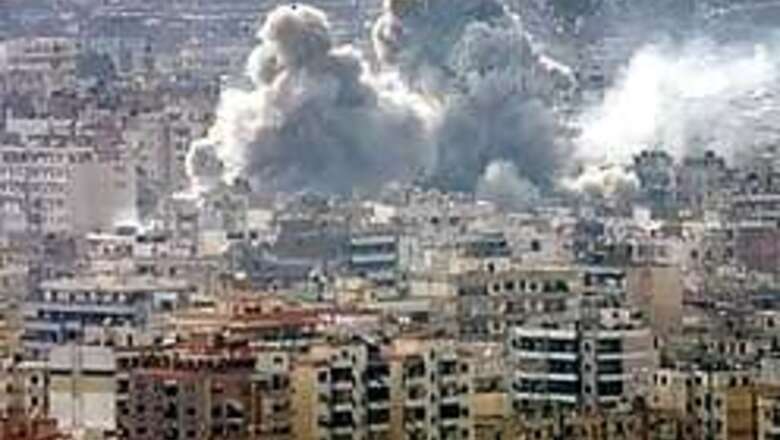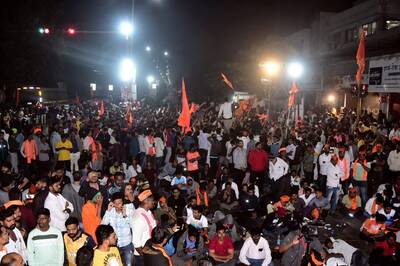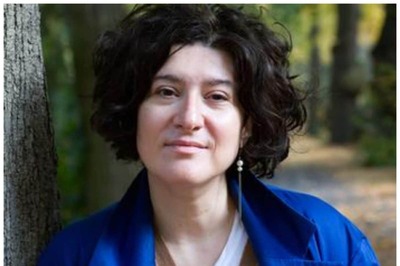
views
Beirut, (Lebanon): Israeli warplanes hit central Beirut for the first time and smashed the Hezbollah leadership's main strongholds, as strikes killed at least 18 Lebanese fleeing the onslaught.
Hezbollah rockets continued to pour into Israel, where officials warned citizens that Tel Aviv could be hit.
The deadly barrages came as Israel charged that Iran's elite Revolutionary Guards have 100 troops in Lebanon providing Hezbollah key support - including helping fire a missile Friday that badly damaged an Israeli warship. Hezbollah denied it.
Neither side showed signs of backing down from the conflict, which erupted Wednesday when Hezbollah captured two Israeli soldiers in a cross-border raid. As civilian deaths mounted, diplomatic efforts to end the crisis had yet to get off the ground.
President Bush, on a trip to Russia, said it was up to Hezbollah ''to lay down its arms and to stop attacking.'' Arab foreign ministers gathered in Cairo but fell into squabbling after moderate states, led by Saudi Arabia, denounced Hezbollah for starting the fight.
In a sign the West expects a drawn-out battle, the US Embassy said it was looking into ways to get Americans in Lebanon to Cyprus. France said it had already decided to send a ferry from Cyprus to evacuate thousands of its nationals.
Police said a 106 people, mostly civilians, have been killed in Lebanon in the four-day Israeli offensive. On the Israeli side, at least 15 have been killed, four civilians and 11 soldiers.
Israeli warplanes demolished the last bridge on the main Beirut-Damascus highway - over the Litani River, six miles from the Syrian border - trying to complete their seal on Lebanon. The strike killed three civilians driving on the bridge.
In the afternoon, Israeli forces hit central Beirut, striking the port and a lighthouse on a posh seafront boulevard, where people stroll in the evening or jog in the early mornings. It is a few hundred yards from the campus of the American University of Beirut.
The seaport is adjacent to downtown Beirut, a district rebuilt at a cost of billions of dollars after the 1975-1990 civil war.
PAGE_BREAK
But the brunt of the onslaught focused more and more on Hezbollah's top leadership in south Beirut and the eastern city of Baalbek. Ambulances raced to a Baalbak residential neighborhood where black smoke rose from airstrikes.
Hezbollah in turn has unleashed rockets on northern Israel with increasing sophistication. Rockets hit Tiberias twice on Saturday, the first such attack on the Israeli city, 22 miles south of the border, since the 1973 Mideast War. The rockets caused no injuries.
An Israeli intelligence official said Hezbollah has missiles with ranges of 60 to 120 miles that could reach Tel Aviv, Israel's largest metropolitan area. The Israeli officials spoke on condition of anonymity because of the sensitivity of the information.
The strike on the warship off Beirut's coast Friday night was the first direct Hezbollah hit on Israel's military since Wednesday's raid. Israel said the strike was carried out with an Iranian-made, radar-guided C-102, missile.
Earlier, the military said the ship was hit by an unmanned, remote-controlled aircraft loaded with explosives. One Israeli soldier was killed and three were missing from the attack, which set the ship ablaze.
An Egyptian merchant ship carrying concrete to Syria was also hit by a Hezbollah rocket at about the same time, injuring a crew member, Egyptian officials said.
Iran is one of Hezbollah's principle backers along with Syria; many believe they are fueling the battle to show their strength in the region. There has been no sign in Lebanon of Iranian Revolutionary Guards - a force that answers directly to Iran's supreme clerical leader - for 15 years, since the end of the country's civil war.
Iran's president, Mahmoud Ahmadinejad, warned Israel on Friday against retaliating against Syria and taunted that Iran itself could not be hit, though both countries deny any involvement.
At a G-8 summit in St. Petersburg, Bush and Russian President Vladimir Putin discussed the worsening situation but appeared divided on how to restore calm.




















Comments
0 comment